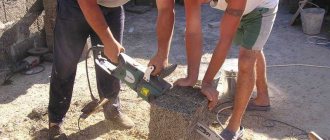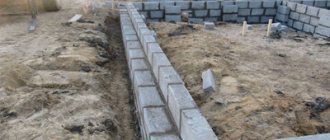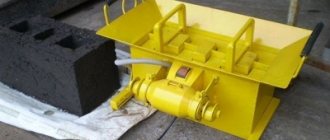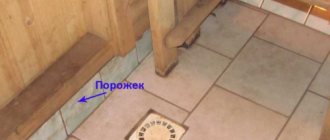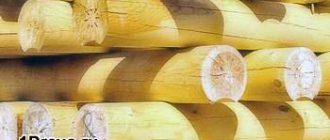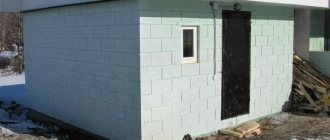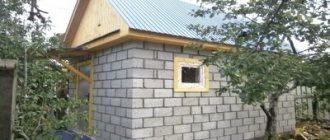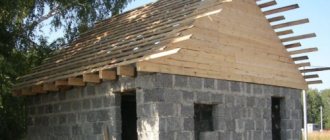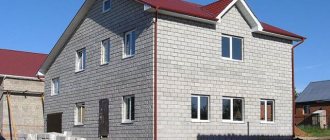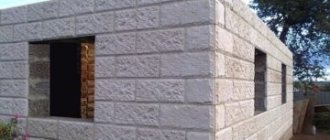- 1 Scope of application
- 2 Manufacturing material 2.1 Elastomers
- 2.2 Plastic
Concrete blocks can be useful in the following cases:
- production of fences, massive building structures;
- production of buildings from concrete blocks;
- construction of small decorative concrete products.
Depending on the desired result, the shape for making the block will differ. The construction market is full of foreign/domestic manufacturers of concrete blocks. They produce material of any complexity category. In the case of self-repair, the option of creating a concrete block with your own hands at home is quite realistic.
Please note: installation of blocks will take much less time compared to other materials due to their size.
Scope of application
More often, concrete blocks are used as the basic element of buildings: garages, multi-storey residential buildings, offices, private houses, summer cottages, etc. The scope of application is not limited to large-scale construction projects. It is possible to independently produce/use concrete blocks at home. The only difficulty: it is necessary to use additional construction equipment (dryer, concrete mixer). A closed room (utility room) with a heater can be used as a dryer. The required temperature for a DIY dryer is 70 degrees. Concrete forms are used for the following products:
- building concrete material;
- decorative architectural elements (vases, borders, sculptures);
- paving slabs (type may vary);
- fencing (including decorative ones);
- drainage trays;
- reinforced concrete building slabs.
Feature: Depending on the product we need, the quality, parts, mold casting will be different. To create a form and then a product with your own hands, you must make accurate calculations, carefully monitor the process, follow the rules of creation, and know the features of the material/future product.
Return to contents
Material for production
The variety of concrete blocks and the features of their application have brought many new materials to the market. The source material that will give the mold quality characteristics may vary depending on the requirements for the final product. Each material is designed for the price category, quality, processing methods, and technical indicators.
Return to contents
Elastomers
Silicone molds for volumetric products.
The production of products with small parts, the creation of the most accurate copies, requires the use of elastomeric molds. Application area:
- complex volumetric products;
- high-precision bas-reliefs;
- architectural constructions.
The production of these products is impossible without the following components:
- rubber (synthetic rubber);
- formoplast;
- compounds (polyurethane/silicone).
Approximate material consumption: 10-40 kg/m2.
Disadvantage: making such a product at home is extremely difficult. Specialized cooking and crushing equipment should be used. In addition, before you start working on the substance, you should consult a specialist. Due to the intricacies of working with the material, such consultation is mandatory.
Return to contents
Plastic
Large-sized constructions that do not require precise geometric calculations are best made from plastic molds. Basic materials:
- fiberglass (low compatibility with the cement matrix, which is why cracks and breaks are possible);
- hard plastic (prone to warping, so the main area of application is paving slabs, curbs, concrete paving stones);
- ABS sheet plastic (prone to delamination, additional silicone lubricant should be used. Small-sized material can be made from it);
- sheet/film polystyrene (represents texture and outlines of objects well, is a fragile material);
- PVC plastic (the most durable, high-quality. Adhesion is as low as possible, does not require cleaning or lubrication).
If you decide to use plastic to make a block, be sure to ensure that you have rigid formwork. It is the formwork that will give the material the necessary relief, rigidity, and ensure easy removal. If this rule is not followed, the product will either fall apart during drying, or the result will be of poor quality and short-lived.
Return to contents
Creating a form yourself
Please note that final processing of the product should be carried out after complete hardening. If the product is raw, further actions (for example, cutting) are illogical and ineffective. Creating a form:
- Start production with available materials. For example, you can use polystyrene foam. Cut out the stamp, fill it with a pre-prepared mixture (sand and cement). You will receive one copy of the concrete decoration mold. You can use plastic containers of different sizes instead of stamps.
- Assemble the product from scraps of chipboard, laminate, wood. The basic rule is that the surface should be smooth. If it is rough, cracks will form between the blocks and the surface or the concrete will be unevenly distributed, which will make it difficult to remove the product.
- Fill the mold with the concrete mixture and leave it for several days until it dries completely (depending on the type of mixture and material of the product. Check the instructions for the material for the required indicators).
- After complete drying, carefully remove (for example, with a spatula or similar object) the finished product.
- Carry out (if necessary) the required decorative work.
If you do not have the time/desire to carry out the process yourself, use the services of construction companies. By contacting the company you need, you can place an order for the form you need. Explain the purpose of construction, the desired material, and specify the timing. For a set price (must be agreed upon in person, by phone), you will be advised and your order will be accepted. Thus, you can be confident in the quality of the resulting product, its durability, and the correctness of its creation.
Return to contents
Requirements for foam concrete formwork
Metal formwork for 84 blocks
It would seem that formwork is like formwork, what could be special about it and what could it correspond to? Sometimes defective foam concrete occurs precisely due to the fault of the form. Either the parameters of the block are inaccurate, or its volume is incomplete, or some products are “ugly”. So what should be the ideal formwork for foam concrete?
What are molds made of?
The finished foam concrete mixture exerts considerable pressure on the walls of the formwork, moreover, during the hydration process, and even if hardening occurs in a “steam room”, a large amount of heat and moisture is released. It is these three factors that “pass judgment” on any formwork.
Over time it warps. What affects the accuracy of products. And how quickly this will happen depends on what material the formwork is made of.
- Wooden rough boards are a pilot option at the beginning of the development of almost any professional or “garage” production. Quite quickly, such formwork fails, and the surface of the products leaves much to be desired. If you decide to use such forms, then before each assembly the wooden elements must be wrapped in cling film and be sure to be lubricated. This will slightly extend the service life and improve the appearance of the blocks.
Assembled laminated plywood formwork
- Instead of boards, production most often uses any other board materials, for example, plain and laminated plywood, OSB sheets. Of all the above, laminated plywood is the most suitable material for formwork, which can withstand any pressure from concrete.
- Plastic. Today on the market of equipment for foam concrete you can find modern formwork made of durable technical plastic with reinforcing elements made of metal. Most often these are forms for tongue-and-groove partition foam concrete blocks.
Formwork with form-building elements made of plastic
Manufacturers position this material as a representative of a new generation of polymers, characterized by the highest strength, resistance to critical temperatures and humid environments. Based on experience, we can say that such plastic elements are really good, but not durable. Internal partitions and parts with grooves and ridges warp, resulting in “wavy” blocks.
Of course, you can replace worn-out parts, but this is an additional cost, and quite a significant one. Alternatively, you can try to make similar elements with your own hands or with the hands of an experienced tinsmith. And the partitions are best cut from laminated plywood, the thickness of which ideally matches the thickness of the “native” walls.
Plastic molds
The photo above shows another type of plastic mold for making piece foam block products. They are not profitable for mass production. Rather, they will be a salvation for those who make small batches using home-made equipment. Over time, the plastic will warp. And you need to take the blocks out of them extremely carefully, since they are very fragile in the first 24 hours after hardening.
- Metal formwork is the most reliable option for mass production. Any element of increased precision can be made from sheet steel blanks. Today you can buy such forms without any problems. Even among used options you can find some good formwork.
Metal collapsible formwork
And it’s quite easy to make such equipment. If only there were suitable equipment and a reliable craftsman... Sheet steel grade St3 with a thickness of 2-4 mm is an excellent raw material base for concrete formwork.
It does not warp under pressure and relatively high temperatures (on average, during steaming at the very peak of hydration processes, the temperature inside a concrete block can rise to 95 degrees). If desired, similar formwork can be made according to the parameters of the trolley so that it can be transported around the workshop and to the steaming chamber.
- Styrofoam. Since we started talking about forms for foam concrete, it would be unfair to remain silent about permanent foam formwork, or as it is also called “Lego blocks”. It is applicable for monolithic construction from commercial foam concrete or any other lightweight mortar. Such forms are prefabricated hollow structures with a convenient and reliable fixation system among themselves.
Polystyrene foam as formwork
It is simply ridiculous to practice such formwork in mass production when it is quite popular in construction. However, recently they have been abandoning it, since the foam itself does not allow moisture to pass through, which creates a greenhouse indoors. This video shows the pouring of the mixture into plastic molds for foam concrete.
Parameter accuracy
The formwork for pouring any concrete products must be simply perfect, since concrete accepts any inaccuracies. As a result, such products are discarded or cut into smaller ones, which are sold as second or first grade. In any case, there are losses in money and labor costs to finalize the defect.
As for foam concrete, the thickness of the assembly seams should be negligible, since under pressure the foam concrete mass simply seeps through these cracks. And the larger they are, the greater the loss of solution. Therefore, if you buy used formwork, be careful. Perhaps large gaps between elements are one of the reasons for selling.
Assembled metal mold
The metal foam concrete formwork shown in the photo above has no bottom. In any case, foam concrete will be squeezed out in these places when pouring. To prevent this, you can simply sand the perimeter of the formwork so that the embankment fits very tightly to the form.
Simplicity
The fewer additional elements on the formwork, the longer it will last. If you make the molds yourself, then provide a reliable, but at the same time simplest assembly system. Let's look at a similar recommendation in the photo below.
- Pay attention to the fastenings of all three models of forms. The first photo shows a simple metal retainer, the second one shows the grooves, and the third one shows a bolted connection. Of the presented options, the first type of fastening is considered the most convenient and durable. If the metal retainer is lost or “loose,” you can always make a “double” to replace it.
- The formwork option shown in the second photo requires several people to maintain it, since one person will not be able to put the side boards in place. In addition, there is a risk that the formwork will not be installed level. And even in the assembled state, one push from the installation boot is enough for part of it to become warped. This is how curved blocks are obtained. This is because there is no bottom, which gives rigidity.
- The third photo shows the classic version of tongue-and-groove formwork with screw connections. But similar fasteners may also be present on ordinary metal forms. The only advantage is reliability, and even then the thread wears off over time. In addition, in order to fix the parts of the formwork well, you need to apply considerable force. If the solution gets on such a fixative, it will be quite difficult to unscrew it.
- Of the three types of formwork presented, the first is the most convenient and reliable. A more detailed photo of it is presented below.
Versatility
The finished formwork is intended for the production of foam blocks of GOST sizes.
The standard parameters of foam concrete products are as follows:
- wall – 600x300x200 mm;
- small – 200x200x200 mm;
- partition – 600x300x100 mm.
But in production practice, that just doesn’t happen. There are customers “with a twist” who are willing to pay any money for the serial production of non-standard blocks. And losing any client is not very pleasant.
Therefore, when you purchase or make molds yourself, it is best if they are universal, i.e. It will be possible to make blocks from them with the usual parameters, and if assembled differently, it becomes possible to fill products of other dimensions.
Storage
Not every formwork will be intensively used in production. There will come a time when you just need to disassemble it and put it in the far corner. Therefore, it is very important that when dismantling, the formwork takes up as little space as possible.
Having figured out what requirements a high-quality form for foam concrete must meet, you can try to make it yourself.
Creating a block yourself
Concrete blocks are an indispensable material for the construction of large-sized buildings. The cost of the material is lower compared to others. In addition, buildings made of concrete will serve you for more than 70 years. In order to reduce costs, you can create a concrete block yourself. Process of creation:
- install the formwork (it needs to be made non-volumetric);
- make a mold from available materials: chipboard, plywood, wooden boards. The form for creating a block should not have a bottom;
- place the product on a smooth surface covered with cloth or film;
- lubricate all formwork parts with oil (to make removal of the finished material easier);
- Mix sand, gravel, lime, cement in a large container. The ratio of mortar to cement should be 1:4. Stir, add water. It is best to add water in cool weather to avoid evaporation. If the water immediately evaporates from the mixture, the possibility of cracking will increase. Choose the right water ratio so that the solution is not too thin or thick;
- fill the product with the resulting solution to the middle;
- lay the wire over the filled form;
- fill the form to the brim with the resulting solution;
- smooth the surface (with any tool) until it becomes smooth.
28 days after the mixture has been prepared, the mixture inside will fully set and acquire the highest strength rating. The only drawback of the process is the drying time. If you don't have time to wait, order a pre-fabricated concrete block. Please note that the price will differ several times. The savings when producing it yourself will be about 70%.
Return to contents
Cheap forms for FBS blocks
Reinforced forms for FBS blocks
Sorting: Link to video from youtube
Partition for FBS forms
new-5140
Designed for casting foundation blocks, made of steel sheets, ensuring structural rigidity, the possibility of reusable use and easy removal of the frame.
RUB 10,740 5,600 rub.
More details
Form for FBS blocks for 1 product
new-3700
Designed for casting foundation blocks, made of steel sheets, ensuring structural rigidity, the possibility of reusable use and easy removal of the frame.
RUB 38,550 RUB 34,850
More details
Mold for making foundation blocks “FBS 24.3.6”
new-2100
Designed for casting foundation blocks, made of steel sheets, ensuring structural rigidity, the possibility of reusable use and easy removal of the frame.
49,000 rub. RUB 46,900
More details
Mold for making foundation blocks “FBS 24.4.6”
new-2500
Designed for casting foundation blocks, made of steel sheets, ensuring structural rigidity, the possibility of reusable use and easy removal of the frame.
52,000 rub. RUB 49,500
More details
Mold for making foundation blocks “FBS 24.5.6”
new-2700
Designed for casting foundation blocks, made of steel sheets, ensuring structural rigidity, the possibility of reusable use and easy removal of the frame.
54,000 rub. RUB 51,300
More details
Mold for making foundation blocks “FBS 24.6.6”
new-7370
Designed for casting foundation blocks, made of steel sheets, ensuring structural rigidity, the possibility of reusable use and easy removal of the frame.
RUB 61,170 RUB 53,800
More details
Mold for the manufacture of FBS fundamental blocks for 2 products
new-2050
Designed for casting foundation blocks, made of steel sheets, ensuring structural rigidity, the possibility of reusable use and easy removal of the frame.
69,300 rub. RUB 67,250
More details
Mold for making foundation blocks “FBS 24.3.6”
new-8400
Designed for casting foundation blocks, made of steel sheets, ensuring structural rigidity, the possibility of reusable use and easy removal of the frame.
RUB 79,900 71,500 rub.
More details
Mold for making foundation blocks “FBS 24.4.6”
new-8300
Designed for casting foundation blocks, made of steel sheets, ensuring structural rigidity, the possibility of reusable use and easy removal of the frame.
RUB 83,900 RUB 75,600
More details
Mold for making foundation blocks “FBS 24.5.6”
new-7100
Designed for casting foundation blocks, made of steel sheets, ensuring structural rigidity, the possibility of reusable use and easy removal of the frame.
RUB 85,900 78,800 rub.
More details
Mold for the production of fundamental blocks “FBS 12.4.6” for 2 products
new-890
Designed for casting foundation blocks, made of steel sheets, ensuring structural rigidity, the possibility of reusable use and easy removal of the frame.
RUB 81,880 RUB 80,990
More details
Mold for making foundation blocks “FBS 24.6.6”
new-5100
Designed for casting foundation blocks, made of steel sheets, ensuring structural rigidity, the possibility of reusable use and easy removal of the frame.
RUB 87,900 RUB 82,800
More details
Mold for FBS foundation blocks for 3 products
new-9020
Designed for casting foundation blocks, made of steel sheets, ensuring structural rigidity, the possibility of reusable use and easy removal of the frame.
110,000 rub. RUB 100,980
More details
Form for making foundation blocks “FBS 9.4.6. for 3 products
new-4850
Designed for casting foundation blocks, made of steel sheets, ensuring structural rigidity, the possibility of reusable use and easy removal of the frame.
RUB 108,330 RUB 103,480
More details
Mold for the manufacture of FBS foundation blocks for 4 products
new-1440
Designed for casting foundation blocks, made of steel sheets, ensuring structural rigidity, the possibility of reusable use and easy removal of the frame.
RUB 135,320 RUB 133,880
More details
Mold for the manufacture of FBS foundation blocks for 5 products
new-14790
Designed for casting foundation blocks, made of steel sheets, ensuring structural rigidity, the possibility of reusable use and easy removal of the frame.
RUB 159,790 145,000 rub.
More details
Mold for FBS blocks for 5 products
new-3850
Designed for casting foundation blocks, made of steel sheets, ensuring structural rigidity, the possibility of reusable use and easy removal of the frame.
RUB 185,650 RUB 181,800
More details
Mold for making FBS blocks for 6 products
new-5640
Designed for casting foundation blocks, made of steel sheets, ensuring structural rigidity, the possibility of reusable use and easy removal of the frame.
RUB 189,300 RUB 183,660
More details
Mold for FBS foundation blocks for 7 products
new-5730
Mold for the production of foundation blocks FBS for 7 products manufactures and sells reliable metal molds for the production of foundation blocks. Our molds are made in special templates, which gives the block an...
260,000 rub. RUB 254,270
More details
Mold for FBS blocks for 8 products
new-3200
Designed for casting foundation blocks, made of steel sheets, ensuring structural rigidity, the possibility of reusable use and easy removal of the frame.
RUB 269,780 RUB 266,580
More details
Mold for the manufacture of FBS foundation blocks for 9 products
new-4130
Designed for casting foundation blocks, made of steel sheets, ensuring structural rigidity, the possibility of reusable use and easy removal of the frame.
RUB 278,630 RUB 274,500
More details
Mold for FBS foundation blocks for 10 products
new—4280
Designed for casting foundation blocks, made of steel sheets, ensuring structural rigidity, the possibility of reusable use and easy removal of the frame.
RUB 326,700 RUB 330,980
More details
